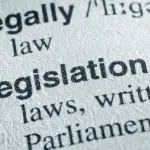 Legislation is a law that has been made and enacted by a legislature, such as a parliament. A single piece of legislation is also known as an act of parliament or a statute, while legislation is broadly known as the statutory law. Formulating new legislation and reviewing and amending existing legislation is the main business of Federal, State and Territory parliaments. Changing or creating legislation is also the main avenue for politicians to initiate change and manage problems in our society. The Rudd government’s contentious ‘alcopops’ tax law, for example, was an attempt to curtail underage and teenage drinking by increasing the cost of pre-mixed spirit drinks. Its Emissions Trading Scheme (ETS) bill was a law to help address the problem of climate change. Not all government-initiated change comes from legislation, however. Kevin Rudd’s 2008 apology to the indigenous ‘Stolen Generation’ was not a law, but simply a statement of apology, read in parliament and endorsed by MPs with a vote.
Legislation is a law that has been made and enacted by a legislature, such as a parliament. A single piece of legislation is also known as an act of parliament or a statute, while legislation is broadly known as the statutory law. Formulating new legislation and reviewing and amending existing legislation is the main business of Federal, State and Territory parliaments. Changing or creating legislation is also the main avenue for politicians to initiate change and manage problems in our society. The Rudd government’s contentious ‘alcopops’ tax law, for example, was an attempt to curtail underage and teenage drinking by increasing the cost of pre-mixed spirit drinks. Its Emissions Trading Scheme (ETS) bill was a law to help address the problem of climate change. Not all government-initiated change comes from legislation, however. Kevin Rudd’s 2008 apology to the indigenous ‘Stolen Generation’ was not a law, but simply a statement of apology, read in parliament and endorsed by MPs with a vote.
Legislation is considered a higher form of law because it can override or annul most other laws, including previous legislation, court-made law or regulations passed by subordinate authorities. Legislation is also the most democratic source of law because it is made by representatives chosen by the people. There is also a degree of self-checking in legislative law-making since most Australian parliaments are bicameral and legislation must be endorsed by a vice-regal authority. In the Federal jurisdiction, for example, legislation can only pass with the approval of both the House of Representatives and the Senate, then the Governor-General (representing the Queen). Once legislation receives royal assent it is proclaimed and enacted and becomes the law of the land – however, even then it is not set in stone, as legislation is subject to review by the courts. Plus any legislation may be abolished, amended or replaced by future parliaments.
There are a number of ways in which the Australian people can participate in the formulation, review and amendment of legislation. The most direct response is to vote against the government responsible for unpopular legislation. Most political commentators believe that the Howard government’s defeat in the November 2007 Federal election was because of its unpopular Workchoices law. Governments tend to avoid creating or passing unpopular legislation for this reason. However, the people can have their say on legislation and perhaps influence change in a number of other ways, as shall be explored in the pages about law reform.
© lawgovpol.com 2014. Content on this page may not be republished or distributed without permission. For more information please refer to our Terms of Use.
